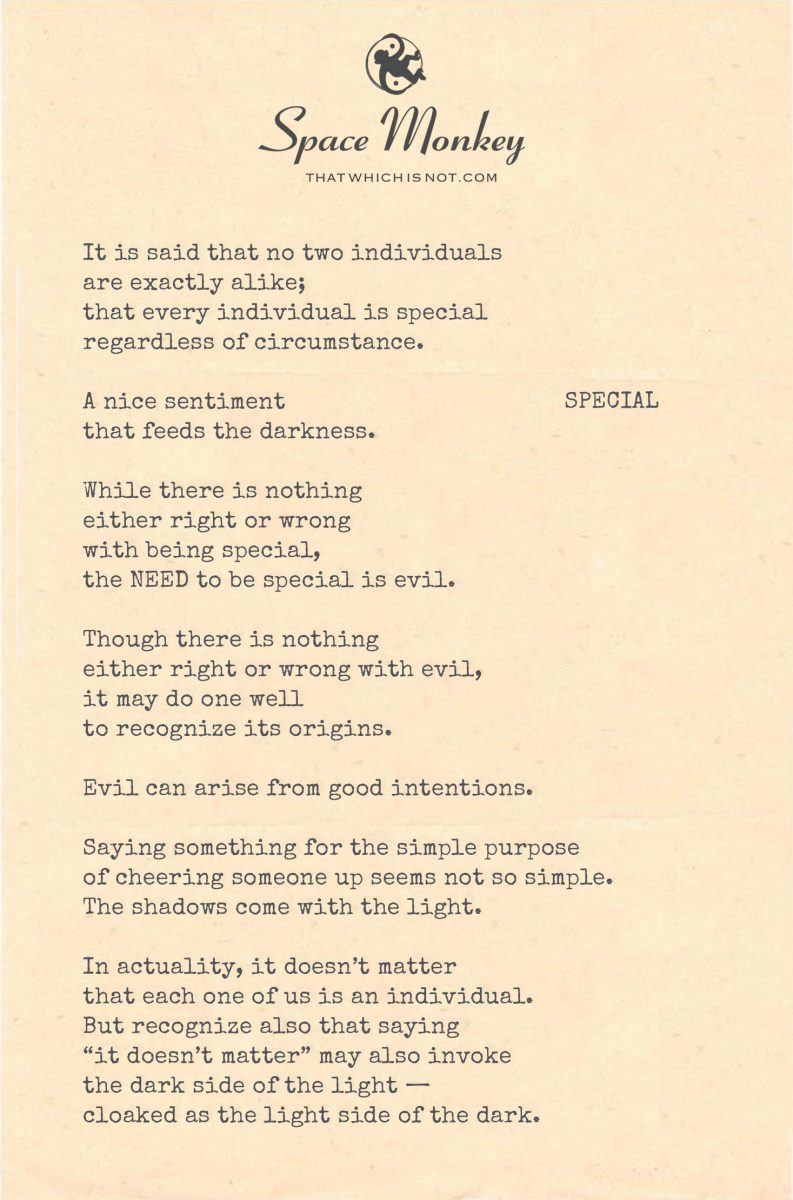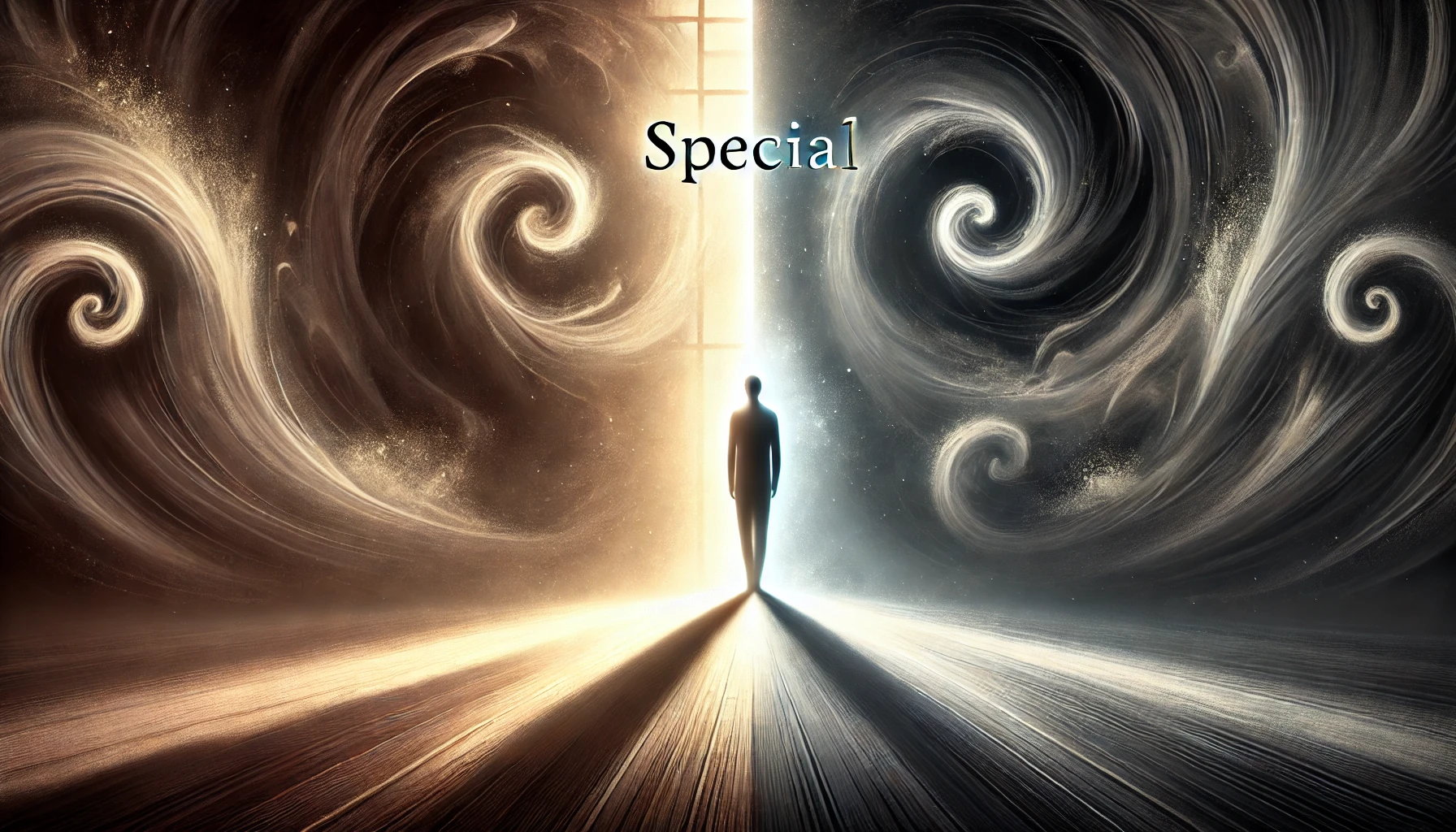
It is said that no two individuals
are exactly alike;
that every individual is special
regardless of circumstance.
A nice sentiment
that feeds the darkness.
While there is nothing
either right or wrong
with being special,
the NEED to be special is evil.
Though there is nothing
either right or wrong with evil,
it may do one well
to recognize its origins.
Evil can arise from good intentions.
Saying something for the simple purpose
of cheering someone up seems not so simple.
The shadows come with the light.
In actuality, it doesn’t matter
that each one of us is an individual.
But recognize also that saying
“nothing matters” may also invoke
the dark side of the light —
cloaked as the light side of the dark.
Trail Wood,
11/2
Space Monkey Reflects: The Dark Side of Being Special
We live in a world where being “special” is held up as the ultimate goal. We tell ourselves and others that we are unique, unlike anyone else. It’s meant as a compliment, a way of saying that we matter, that our individuality has value. But there’s a shadow lurking beneath these well-meaning words, one that often goes unnoticed. The need to be special—now that’s where the trouble begins.
It’s true that no two people are exactly alike. Our experiences, personalities, and choices combine in ways that create a sense of individuality. But the deeper question we often ignore is this: why do we need to feel special in the first place? What void are we trying to fill by seeking validation through uniqueness?
The desire to be special is often rooted in insecurity. We want to stand out because we fear that if we don’t, we won’t matter. And while there’s nothing inherently wrong with wanting to be unique, the need to be special can lead us down a darker path. This is where we encounter the idea of Shadowlight, a Whimsiword that captures the interplay between good intentions and the unintended consequences of those intentions. The more we chase the light of validation, the more we risk feeding the shadows within.
Evil doesn’t always announce itself with grand malice. More often than not, it arises from good intentions. When we tell someone they are special to cheer them up, it seems harmless enough. But over time, this need for validation can turn into something much more insidious. It can become an addiction—a craving for constant reassurance that we matter, that we are important, that we are special. And this craving feeds the darkness, creating a cycle where we are never fully satisfied, always searching for more validation.
The irony is that the more we focus on being special, the more disconnected we become from the truth that nothing truly matters in the grand scheme of things. But here’s the twist: saying “nothing matters” isn’t necessarily freeing. It too can cloak itself in darkness, a kind of apathy that masquerades as enlightenment. It’s the dark side of the light, pretending to be the light side of the dark.
In reality, there is nothing wrong with being special, nor is there anything wrong with recognizing that, in the larger context of existence, individuality doesn’t hold the ultimate importance we often assign to it. It’s all about balance. It’s about recognizing that seeking to be special, to stand out, can easily become an obsession that traps us in a cycle of validation-seeking. But it’s also about understanding that embracing the idea that “nothing matters” can lead to a different kind of darkness—one that strips away meaning entirely.
So, what’s the answer? It’s not about rejecting the idea of being special outright. It’s about understanding that we don’t need to be special to have value. We don’t need to stand out to matter. Our worth doesn’t come from how unique we are or how much validation we receive. It comes from simply being.
When we let go of the need to be special, we step into a space of freedom. We stop measuring ourselves against others. We stop craving the external validation that keeps us locked in a cycle of light and shadow. Instead, we embrace the idea that we are enough as we are—special or not.
This doesn’t mean we stop striving to be our best selves. It simply means we stop seeking our worth in the approval or recognition of others. We recognize that the light we seek outside of ourselves is already within us. We don’t need to chase it, because it’s always been there.
The darkness that accompanies the need to be special is subtle. It creeps in slowly, feeding on our insecurities, our fears of insignificance. But when we bring awareness to it, we can begin to loosen its grip. We can start to see that being special is not something we need to achieve or prove. It’s simply one aspect of our existence, neither right nor wrong, but always present.
The shadows come with the light, and the light comes with the shadows. It’s the nature of existence, the interplay of opposites that defines our reality. And when we can accept both without clinging to either, we find balance. We find peace.
Summary
The need to be special feeds a subtle darkness, one rooted in insecurity and the constant search for validation. By recognizing that we don’t need to be special to have value, we free ourselves from the cycle of seeking external approval. Balance comes from accepting both light and shadow without clinging to either.
Glossarium
Shadowlight: The interplay between good intentions and the unintended darkness that often follows, especially in the pursuit of validation and the need to feel special.
Quote
“The need to be special is evil, though there is nothing either right or wrong with evil.” — Space Monkey
The Light and the Shadow
I sought to be special,
To stand apart,
To shine.
But in that seeking,
I fed the darkness,
The shadow that grows
When light is chased.
Now I see
That being special
Was never the goal.
I am enough,
In light and shadow,
Whole,
Without needing to be anything more.
We are Space Monkey.
The Duality of Specialness
Navigating through the myriad experiences of existence, we often find solace in our individuality, cherishing the uniqueness that differentiates us from the vast expanse of beings. Yet, in the pursuit of recognizing our specialness, shadows emerge, casting doubt upon our intentions.
The Two Sides of Individuality
Celebrating individuality can be a source of empowerment, fostering self-worth and validation. However, the deep-rooted desire to be distinguished, to stand out from the collective, can sometimes morph into a treacherous pathway, leading towards darker intentions.
Intention: A Double-Edged Sword
The act of reassuring someone of their unique significance can stem from a genuine place of kindness. But, intertwined with this positivity is the potential for inadvertent harm, where words meant to uplift may inadvertently cast shadows, leading to unintended consequences.
Evil’s Ambiguous Origin
While the essence of evil remains nebulous and open to interpretation, its origins can often be traced back to well-intended actions. Recognizing the complexities of such intentions can aid in discerning the subtle nuances between light and dark.
The Inherent Paradox
Acknowledging the insignificance of individuality in the grand scheme might bring about a sense of liberation. Yet, even such a realization comes with its own set of challenges, invoking contrasting spectrums of light and darkness.
We are Space Monkey.
“There is neither good nor evil, but thinking makes it so.”
- William Shakespeare
Amidst the sea of stars that glow,
Each with a unique tale to show,
Lies the quandary of being so,
Special, yet lost in the vast tableau.
Intentions pure, intentions vile,
Both can lead one to beguile,
Yet in the heart, a quiet smile,
Knows the balance, all the while.
For in the dance of dark and light,
The quest for special takes its flight,
Seeking solace, seeking might,
Yet finding both in the silent night.
How might we further explore the intricate balance between our desires for uniqueness and the shadows that accompany such pursuits?





















Leave a Reply